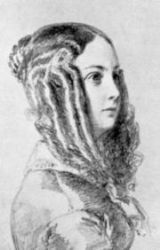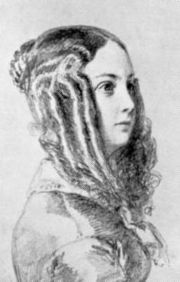
Louise Colet
Encyclopedia
Louise Colet born Louise Revoil, was a poet born in Aix-en-Provence
in France
. In her twenties she married Hippolyte Colet, an academic musician, partly in order to escape provincial life and live in Paris
.
 Upon arrival in Paris, Colet began to submit her work for approval and publication and soon won a two-thousand-franc
Upon arrival in Paris, Colet began to submit her work for approval and publication and soon won a two-thousand-franc
prize from the Académie française
, the first of four prizes won from the Académie. Today critics claim she won the prizes, not by merit, but through the influence of friends. At her salon
she associated with many of her contemporaries in the Parisian literary community, such as Victor Hugo
.
In 1840 she gave birth to her daughter Henriette, but neither her husband nor her lover, Victor Cousin
, would acknowledge paternity. Later she became the paramour of Gustave Flaubert
, Alfred de Musset
, and Abel Villemain. After her husband died, Colet supported herself and her daughter with her writing.
Her brother was the painter Pierre Révoil
. Louise Colet died in Paris.
Though married to Hippolyte Colet, Louise had a steamy eight-year affair, in two stages, with Gustave Flaubert. The relationship turned sour, however, and they broke up. Louise is said to be the inspiration for Gustave Flaubert's famous book, Madame Bovary, a story of an adulterous woman whose ideals and desires lead to her own ruin. Louise was allegedly so angered by the publication of this book that she wrote her own book, Lui, in an effort to target Flaubert. However, Colet's book has failed to have the lasting significance of Madame Bovary. Flaubert's dozens of long letters to her, in 1846-1847, then especially between 1851 and 1855, are one of the many joys of his correspondence. Many of them are a precious source of information on the progress of the writing of Madame Bovary. In many others, Flaubert gives lengthy appreciations and critical comments on the poems that Louise Colet sent to him for his judgment before offering them for publication. The most interesting of these comments show the vast differences between her and him on the matter of style and literary expression, she being all gushing self-indulgent Romanticism, he deeply convinced that the writer must abstain from gush and self-indulgence.
Aix-en-Provence
Aix , or Aix-en-Provence to distinguish it from other cities built over hot springs, is a city-commune in southern France, some north of Marseille. It is in the region of Provence-Alpes-Côte d'Azur, in the département of Bouches-du-Rhône, of which it is a subprefecture. The population of Aix is...
in France
France
The French Republic , The French Republic , The French Republic , (commonly known as France , is a unitary semi-presidential republic in Western Europe with several overseas territories and islands located on other continents and in the Indian, Pacific, and Atlantic oceans. Metropolitan France...
. In her twenties she married Hippolyte Colet, an academic musician, partly in order to escape provincial life and live in Paris
Paris
Paris is the capital and largest city in France, situated on the river Seine, in northern France, at the heart of the Île-de-France region...
.

Franc
The franc is the name of several currency units, most notably the Swiss franc, still a major world currency today due to the prominence of Swiss financial institutions and the former currency of France, the French franc until the Euro was adopted in 1999...
prize from the Académie française
Académie française
L'Académie française , also called the French Academy, is the pre-eminent French learned body on matters pertaining to the French language. The Académie was officially established in 1635 by Cardinal Richelieu, the chief minister to King Louis XIII. Suppressed in 1793 during the French Revolution,...
, the first of four prizes won from the Académie. Today critics claim she won the prizes, not by merit, but through the influence of friends. At her salon
Salon (gathering)
A salon is a gathering of people under the roof of an inspiring host, held partly to amuse one another and partly to refine taste and increase their knowledge of the participants through conversation. These gatherings often consciously followed Horace's definition of the aims of poetry, "either to...
she associated with many of her contemporaries in the Parisian literary community, such as Victor Hugo
Victor Hugo
Victor-Marie Hugo was a Frenchpoet, playwright, novelist, essayist, visual artist, statesman, human rights activist and exponent of the Romantic movement in France....
.
In 1840 she gave birth to her daughter Henriette, but neither her husband nor her lover, Victor Cousin
Victor Cousin
Victor Cousin was a French philosopher. He was a proponent of Scottish Common Sense Realism and had an important influence on French educational policy.-Early life:...
, would acknowledge paternity. Later she became the paramour of Gustave Flaubert
Gustave Flaubert
Gustave Flaubert was a French writer who is counted among the greatest Western novelists. He is known especially for his first published novel, Madame Bovary , and for his scrupulous devotion to his art and style.-Early life and education:Flaubert was born on December 12, 1821, in Rouen,...
, Alfred de Musset
Alfred de Musset
Alfred Louis Charles de Musset-Pathay was a French dramatist, poet, and novelist.Along with his poetry, he is known for writing La Confession d'un enfant du siècle from 1836.-Biography:Musset was born on 11 December 1810 in Paris...
, and Abel Villemain. After her husband died, Colet supported herself and her daughter with her writing.
Her brother was the painter Pierre Révoil
Pierre Révoil
Pierre Révoil was a French painter of the Troubadour style. He was the elder brother of the poet Louise Colet and friend of François Fleury-Richard.- Bibligraphic reference :...
. Louise Colet died in Paris.
Though married to Hippolyte Colet, Louise had a steamy eight-year affair, in two stages, with Gustave Flaubert. The relationship turned sour, however, and they broke up. Louise is said to be the inspiration for Gustave Flaubert's famous book, Madame Bovary, a story of an adulterous woman whose ideals and desires lead to her own ruin. Louise was allegedly so angered by the publication of this book that she wrote her own book, Lui, in an effort to target Flaubert. However, Colet's book has failed to have the lasting significance of Madame Bovary. Flaubert's dozens of long letters to her, in 1846-1847, then especially between 1851 and 1855, are one of the many joys of his correspondence. Many of them are a precious source of information on the progress of the writing of Madame Bovary. In many others, Flaubert gives lengthy appreciations and critical comments on the poems that Louise Colet sent to him for his judgment before offering them for publication. The most interesting of these comments show the vast differences between her and him on the matter of style and literary expression, she being all gushing self-indulgent Romanticism, he deeply convinced that the writer must abstain from gush and self-indulgence.
Writings of Louise Colet
- Fleurs du midi (1836)
- Penserosa (1839)
- La Jeunesse de Goethe (1839)
- Les Coeurs brisés (1843)
- Les Funérailles de Napoléon (1840)
- La Jeunesse de Mirabeau (1841)
- Lui (1859)
- Enfances Célèbres (1865)
Texts online (in French)
- Qui est-elle ? (1842)
- Diane, fragment d'un roman inédit (ca 1850)
- L'Institutrice (1840).
- Enfances célèbres

